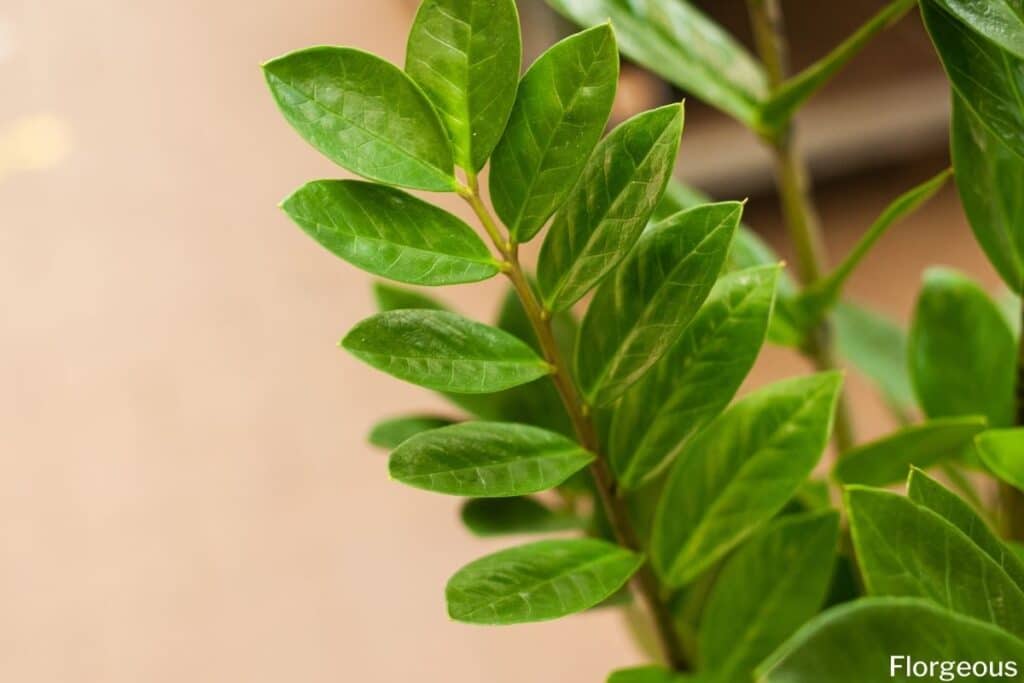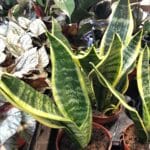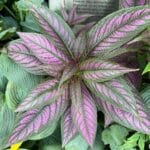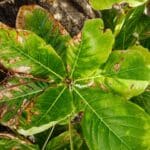The ZZ plant (Zamioculcas zamiifolia or Zanzibar Gem) is one of the most interesting and easy to grow houseplants available today. Although this plant has definite environmental health benefits, it also has some mild health risks that you should be aware of.
Read this article to learn all you need to know about ZZ plant toxicity.
Is ZZ Plant Poisonous to Cats and Dogs?
Unfortunately, the ZZ plant is toxic. The plant’s sap contains calcium oxalate crystals which are highly irritating if ingested. Effectively, this means that all parts of the plant should be considered poisonous and unsafe around small pets and children like cats and dogs.
The crystals are tiny, but incredibly sharp and will irritate the lips, mouth, throat, and digestive system, potentially causing discomfort, swelling, nausea, and diarrhea.
In severe cases, ZZ plant exposure can cause swelling of the tongue or throat, leading to life-threatening complications like suffocation. If you suspect your child or pet has come into contact with any part of the ZZ plant, seek immediate medical attention from a veterinarian or poison control center.
Contact with the ZZ plant could possibly cause skin irritation in sensitive individuals, although this is one of the rare cases. For this reason, wearing gloves is advisable when repotting and working with this plant.
Contact with the eyes should also be avoided as this could potentially result in serious irritation. Make sure you wash your hands after working with these plants from araceae family and be sure to avoid touching your eyes or mouth while wearing your gloves or until you have washed your hands.
ZZ plant cats symptoms
The ZZ plant (Zamioculcas zamiifolia) is considered mildly toxic to cats if ingested. Symptoms may include vomiting, diarrhea, drooling, and lethargy. Cat parent should be aware that their feline companions may also experience oral irritation, such as mouth and throat irritation or swelling.
In severe cases, ingestion of ZZ plant foliage may lead to more serious symptoms like difficulty swallowing, difficulty breathing, or even kidney failure. If you suspect your cat has ingested any part of a ZZ plant and is showing symptoms, it’s crucial to seek immediate veterinary attention. Keep these poisonous plants out of reach of cats and consider safer plant options if you have curious pets.
Keeping Your Pets Safe
Unfortunately, the ZZ plant carries the same risk for your pets as it does for humans, so this plant is generally not recommended for pet owners. If you do share your living space with pets, ensure that your ZZ plants are placed in an area that is inaccessible to them, thus avoiding any potential issues.
Here are a few other ways to help keep your pets safe if you have toxic house plants:
Get Some Chew Toys
Make sure your pets have toys of their own to play with. If your pets have safe toys, they will be far less likely to look for other objects to chew on.
Position The Plant Where It Is Out Of Reach
This is far easier with dogs than it is with cat’s unfortunately, but it can be a very simple and effective way of avoiding accidents. While a cat can easily access a plant set on a table or a cabinet, a hanging pot can be a very effective way of keeping both your cats and dogs away from your ZZ plant
Keep The Plant Behind Glass Or Closed Doors
You can keep toxic plants in a specific part of the house like your bedroom for example, where pets can be kept out. It may sound harsh but it is for the benefit of both your pets and your plants. Alternatively, consider setting up a grow room, perhaps complete with grow lights, where you can safely keep a collection of indoor plants.
Try A Repellent
Spraying the pot, or area around your plant with a substance like citronella oil can be helpful for keeping pets at bay. Of course, you should avoid getting any potentially harmful substances on the plant itself. Be sure to test this out to figure out how effective it is likely to be before putting all your faith in the technique.
Replacing Them with Pet Friendly Plants
One effective way to keep pets safe from ZZ plants is by replacing them with pet-friendly plants. Opt for safe alternatives such as spider plants, Boston ferns, or cat grass. These plants provide a safe environment for curious pets, reducing the risk of ingestion-related illnesses. Be sure to research and select plants that are specifically labeled as safe for pets.
Additionally, place plants out of reach or use deterrents like bitter sprays to discourage chewing. By creating a pet-friendly environment with non-toxic plants, you can ensure your pets’ safety and enjoy the beauty of indoor greenery worry-free. Remember that there are plenty of other plants that can coexist harmoniously with your furry companions!
FAQs
Are ZZ plants toxic to kittens?
Yes, ZZ plants (Zamioculcas zamiifolia) are considered toxic to cats if ingested. The plant contains calcium oxalate crystals, which can cause oral irritation, vomiting, and difficulty swallowing if eaten by cats.
What is the most toxic house plant for cats?
The most toxic houseplants for cats include lilies (all species), sago palm (Cycas revoluta), oleander (Nerium oleander), and philodendrons (Philodendron spp.). Ingesting these plants can cause severe toxicity and even death in cats.
Can cats smell if a plant is toxic?
While cats may not be able to detect toxicity in plants through smell alone, they may instinctively avoid plants with strong odors or textures that are unpleasant to them. However, cats are curious animals and may still investigate or chew on plants, especially if they are attracted to their appearance or texture.
What happens if a cat eats a toxic plant?
If a cat eats a toxic plant, it can experience a range of symptoms depending on the plant species and the amount ingested. Common signs of plant toxicity in cats include drooling, vomiting, diarrhea, lethargy, difficulty breathing, seizures, and even organ failure. It’s essential to seek immediate veterinary care if you suspect your cat has ingested a toxic plant.
Conclusion
It is unfortunate that the wonderful Zanzibar Gem carries health risks for pets and people. While potentially serious symptoms can occur from accidental ingestion of this plant, It is still considered a safe house plant as long as certain precautions are taken. If you are in any doubt, however, choose a completely non-toxic species for your home instead.
Up next: Chinese Evergreen Toxic to Cats: Symptoms and Safety Tips







